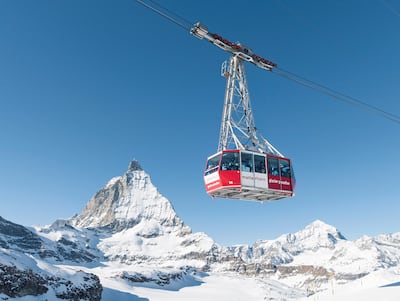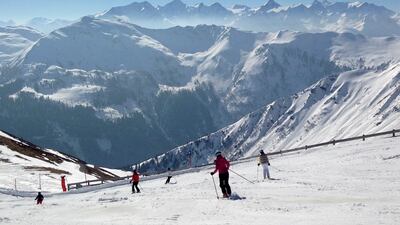With cable cars, traditional food and clean mountain air, leaders in the Alps want to promote their region as the next hub for green tourism.
Europe’s tallest mountain range receives more than 100 million visitors a year thanks to its ski slopes and picturesque landscapes stretching across eight countries.
But the Alps are particularly vulnerable to disasters caused by climate change, such as landslides, flooded valleys and melting glaciers.
Regional leaders want to limit the risks by encouraging tourists to visit for nature-based health trips and pushing local residents to use green transport.
Speaking on an EU panel on Tuesday, they described the green transition as an opportunity to promote the heritage of the Alps.
“The Alps are the perfect living lab for the green economy and innovation,” said Raffaele Cattaneo, environment minister for Italy’s Lombardy region.
He supports the idea of “smart villages”, high-tech Alpine settlements with a low carbon footprint, which could become a model for other areas.
With cross-Alpine freight traffic accounting for significant carbon emissions, zero-emission vehicles should help mountain dwellers to go green, he said.
Locals are “used to practising this kind of economy for many centuries”, he said. “They are used to using natural resources in the best way. There is a wisdom, there is a knowledge in the people living in the Alps.”

Green transport
Alpine leaders are encouraging locals, as well as tourists, to go hiking and cycling in the mountains. They hope electric bikes and cable cars will be part of the solution.
Popular with tourists and skiers, cable cars are regarded as environmentally friendly because the cabins themselves have no engine and are lifted by an electric winch.
“It is made for everyday hikers, but if it can be of use to everyone, well then it fits into our project,” said Fabrice Pannekoucke, an official in charge of mountain areas in the Auvergne-Rhone-Alpes region of France.
He said efforts to promote a green lifestyle should not focus solely on tourism but should also “take into account our activities on a daily basis”.
One milestone for the region will be the 2026 Winter Olympics in Milan, Italy, which organisers have promised to make a sustainable Games.
Organisers recently joined a Sports for Climate Action campaign led by the UNFCCC, the UN climate change body that is involved in organising the Cop26 summit.
“There is a clear movement from the old Olympic Games, made by great infrastructure, a lot of new construction and a great impact of the environment, to a new vision where the Olympic Games will be a success if they are sustainable,” Mr Cattaneo said.
In Salzburg, Austria, locals witnessed a rise in health tourism during the pandemic as visitors sought clean air and refuge in nature.
It was a rare bright spot in a bleak year for the tourist industry after international travel was curtailed to stop the virus spreading.
Brigitta Pallauf, the president of the Salzburg parliament, said studies had shown that the clean Alpine air and water were good for people’s health.
She said alpine areas have high life expectancies, and the Krimml Waterfalls near Salzburg are believed to help asthma and allergy sufferers.

Healthy living
Ms Pallauf echoed Monday’s message from the World Health Organisation that adopting greener lifestyles would be beneficial to public health.
“We need to look at the strengths of our regions,” she said. “It’s about having a natural tourism that supports health.
“We have the obligation to save nature, protect the environment and combine this with tourism. We need quality instead of quantity.”
Luciano Caveri, a minister in Italy’s Aosta Valley region, said some visitors had sought out the Alps as a place to work remotely during the pandemic.
Others have come to see the region’s historic iron and copper mines, which have been put to more sustainable use as tourist attractions.
“They want to visit, they want to discover areas. Of course, there are the mountains, they want to ski, but they are also interested in culture, in history,” he said.
Like others on the panel, Mr Caveri highlighted culinary offerings such as Alpine meats and cheeses as another way to tempt tourists.
The region’s food has been nominated for Unesco status and was described as a critical part of Alpine heritage.
“We have to also keep the knowledge and the know-how,” Mr Caveri said. This means maintaining traditions to face a world that might become globalised so that we would all have the same food, habits, eating the same things.
“I think that it’s important to cultivate differences, because the Alpine population has a lot of things that are similar but also a lot of things that are very particular and change from valley to valley.”
Cities
But cities, as the largest polluter and emitter, also have a key role in reaching net-zero, a message highlighted by a webinar organised by the Institute for Government, a think tank in London.
Christopher Hammond, a member of UK100, a network of climate-conscious, locally elected leaders in Britain, said local government would be essential.
“If you think about what happened during the pandemic, local authorities showed that they could mobilise, work across boundaries of the public sector and the private sector, continue to deliver services and get funding out of the door,” said Mr Hammond, a local government councillor in the southern English city of Southampton.
“In many cases they had to create new services in a matter of days, as opposed to months, or years, which has been the record in the past.”
But he said the national government needed to empower local authorities in order to further the climate push, “so that they can go out to the businesses, the charities, the organisations and convince the public about the behaviour changes that are going to be needed”.


